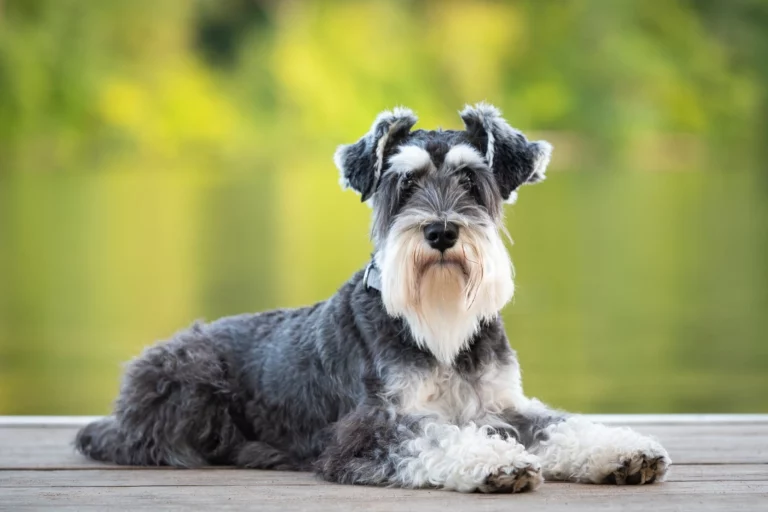Miniature Schnauzer Dog Breed
The Miniature Schnauzer is a small dog with a big personality, making it a favorite for dog lovers and those looking for a new pet. Having transitioned from their original role as a farm pest controller in Germany, today they’re commonly found as cherished family dogs in homes across America.
They’re easy to recognize with their unique beard and eyebrows and have thick coats in various colors. These intelligent and people-friendly dogs are keen learners, although their stubborn streak occasionally surfaces, mainly when left alone. The American Miniature Schnauzer Club reports that these dogs usually enjoy good health, although all breeds can inherit specific health issues, in which case a veterinary consultation is advised.
Getting acquainted with the Miniature Schnauzer exposes their journey from German farm helpers to loved family dogs, revealing the high prey drive they sparked during their past agricultural work. Knowing their historical journey from farm pest-catchers to household pets can give one a deeper appreciation of their distinctive qualities—favored by dog enthusiasts and American Miniature Schnauzer Club members. The Miniature Schnauzer is a small, personable dog, once a German farmhand, now a beloved pet. Their distinct beard, eyebrows, and varied-color thick coat make them recognizable. While they exhibit intelligence and occasional stubbornness—especially when left alone—these dogs are generally known for their robustness, but some could inherit health issues requiring veterinary attention.
Key Takeaways:
- German origins: A small dog transitioning from farm work to family life.
- Distinctive features: Recognizable by their beard, eyebrows, and coat colors.
- Health and temperament: Smart and sociable, with potential inherited health concerns.
Explicit language and brevity outline the breed’s background, appearance, and health. The conversational tone and active voice provide a direct, engaging description. Essential aspects are highlighted in bold to draw attention.
Quick Facts
Miniature Schnauzers are known for being small and friendly, making them a favorite among dog lovers and securing the 17th position on the American Kennel Club’s popularity ranking. They stand between 12 to 14 inches tall and weigh 11 to 20 pounds. These dogs are the tiniest of the Schnauzer family yet have a muscular build, which helps them live a long life of about 12 to 15 years.
These dogs are part of the Terrier Group and are known for their sharp minds and ease of training. Out of 140 breeds, they rank 12th regarding obedience and learning. Miniature Schnauzers require regular grooming due to their coarse, wiry coats, which come in colors like black, pepper, salt, black and silver, and white. They are energetic, friendly, and adaptable, perfect for different homes and lifestyles.
Miniature Schnauzer Dog Breed Pictures
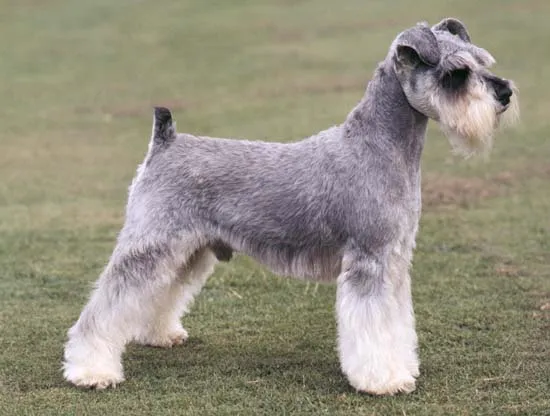
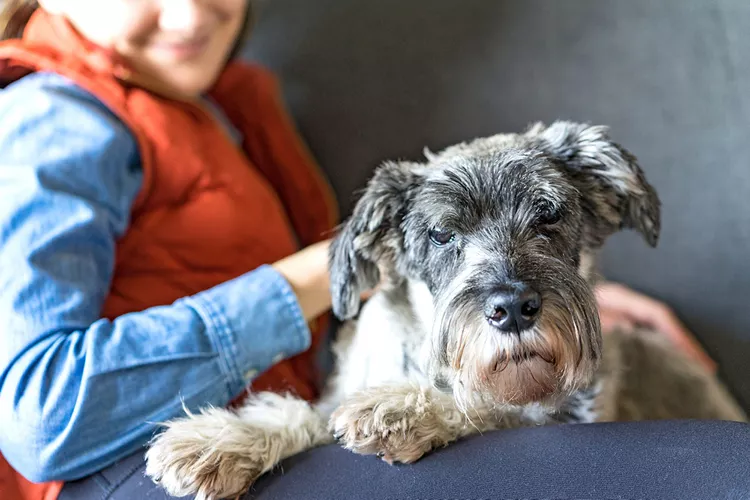
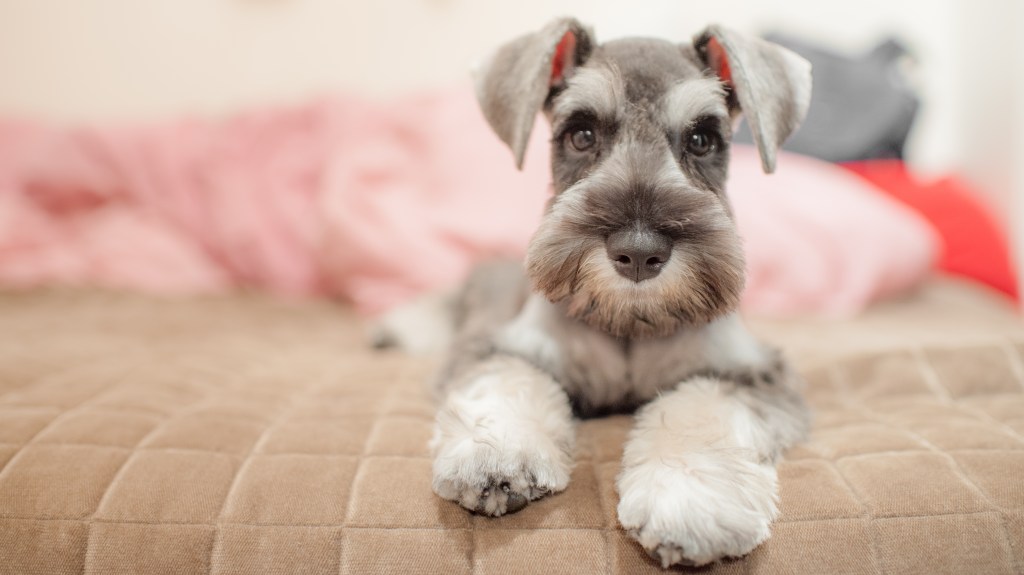
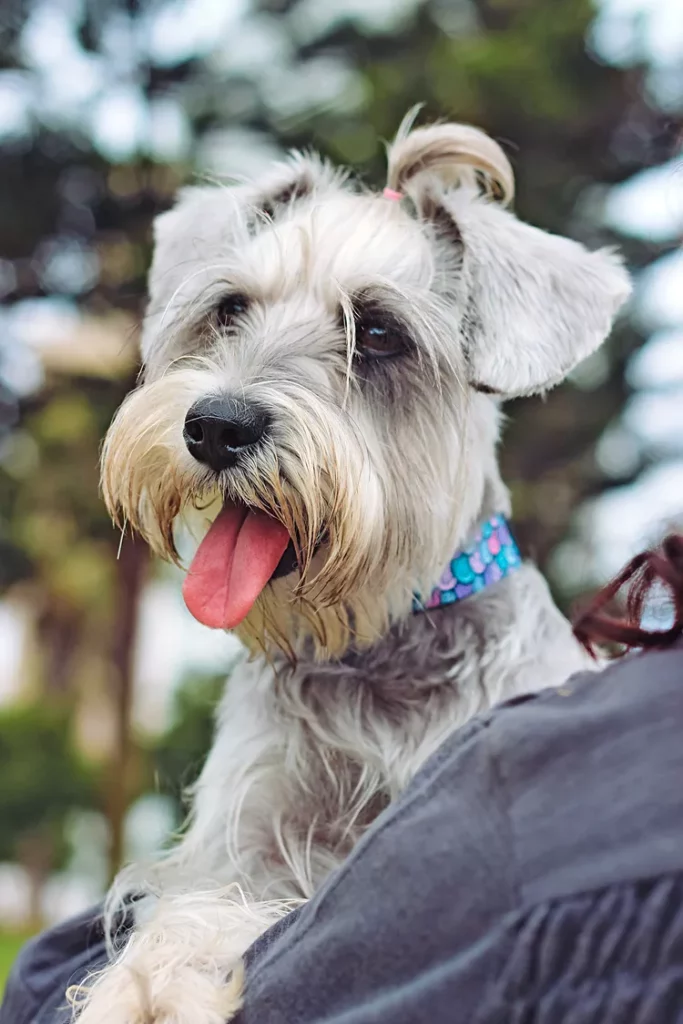
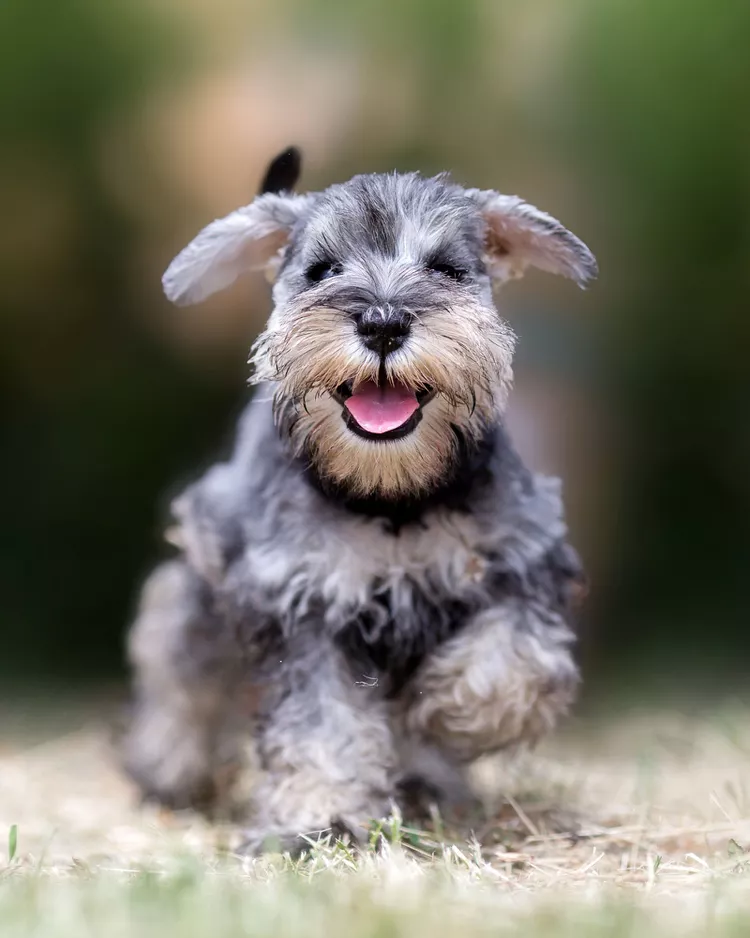
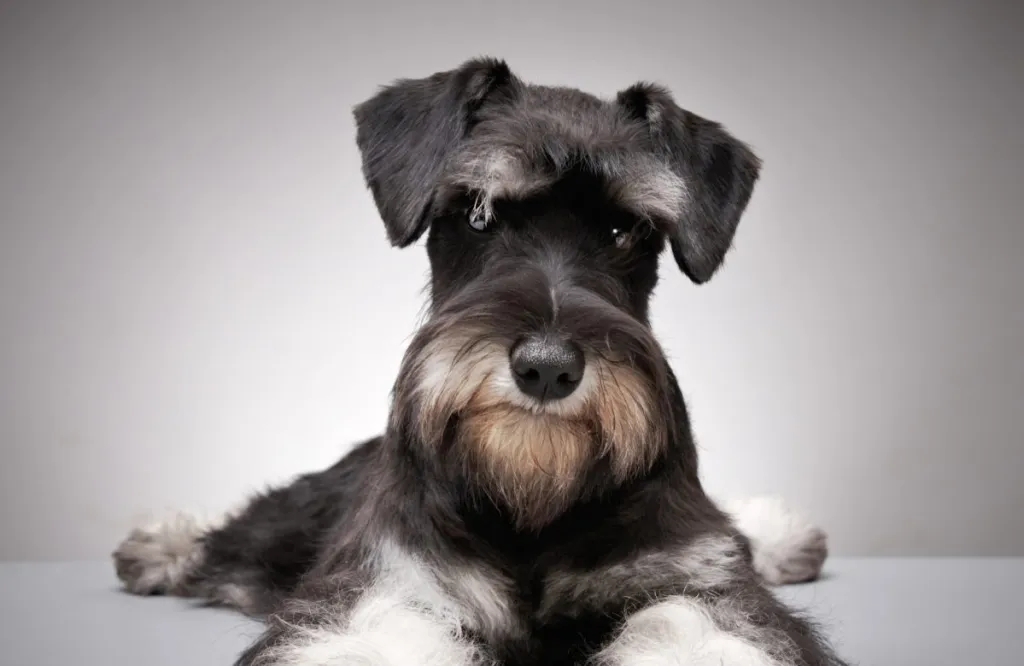
Overview
Miniature Schnauzers came from Germany and were first bred in the late 1800s. These hardy and intelligent dogs are part of the Terrier Group and are known for their friendly nature and unique look, which requires frequent grooming. The American Kennel Club ranks them as the 17th most beloved dog breed. They typically stand about 12 to 14 inches tall and weigh between 11 and 20 pounds.
Miniature Schnauzers have a lifespan of 12 to 15 years and are celebrated for their friendly, quick-thinking nature and their skills as guard dogs. They need a specific grooming routine, including a particular haircut style. The breed comes in four recognized colors and can adapt to different roles in the canine world.
The AKC promotes responsible dog ownership and excellent training through resources like AKC—TV and programs like the Canine Good Citizen and AKC STAR Puppy.
Miniature Schnauzers are a versatile and adaptable breed that originated in Germany in the late 19th century. Known for their robust health and intelligence, these dogs fit well into the Terrier Group with their amiable nature and a look that calls for consistent grooming. The American Kennel Club has placed them as the 17th top dog breed.
These dogs stand around 12 to 14 inches tall, ranging from 11 to 20 pounds. With a lifespan of 12 to 15 years, Miniature Schnauzers are appreciated for their good-natured, clever personalities, and they make excellent guard dogs. A proper grooming routine is essential for this breed, including a specific haircut style.
Recognized in four colors internationally, Miniature Schnauzers can perform various tasks in the dog community. The AKC encourages good dog ownership and training through outlets like AKC—TV and programs like the Canine Good Citizen and AKC STAR Puppy.
Breed Hallmarks
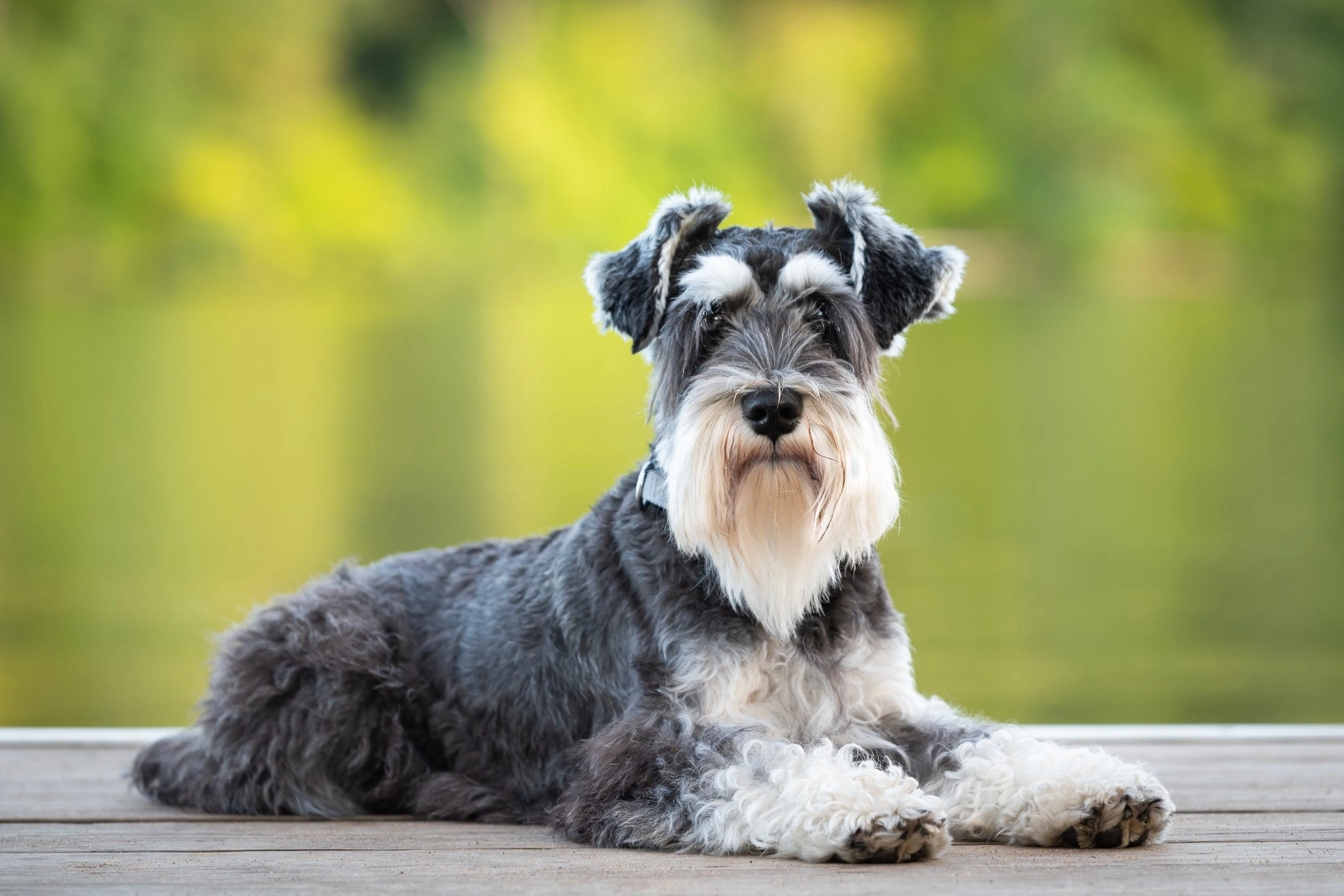
Focusing on the Miniature Schnauzer, we see distinct features that set this breed apart. These German dogs are known for their adaptability on farms, used for tasks like rat catching and livestock guidance. Their square body shape is a notable trait, matching their height and weight proportions. The dual-layer coat, with a rigid top and soft underlayer, serves a purpose and stands out, but it does need regular grooming to keep it in good shape. Their naturally shaped ears and animated expressions perfectly match their friendly and intelligent nature.
| Characteristic | Description | Grooming Requirements |
|---|---|---|
| Build | Square, 12-14 inches in height | Groom every six weeks |
| Coat | Dense with a hard topcoat and a soft undercoat | Stripping or clipping |
| Color Options | Sociable, intelligent, vigilant | Breed-specific haircut |
| Temperament | Sociable, smart, vigilant | – |
| Job | Pest control, livestock management, property protection | – |
The Miniature Schnauzer has a square build and stands 12-14 inches tall. Regular grooming every six weeks is needed to maintain its appearance. The breed’s double coat features a wiry top layer and a soft undercoat, which requires either stripping or clipping. Available in colors like black, pepper and salt, black and silver, and white, they need a specific haircut to look their best. Their personality is friendly and intelligent, and they’re always alert. They are traditionally used for ratting, herding, and guarding.
Pet Parents Breed Origins
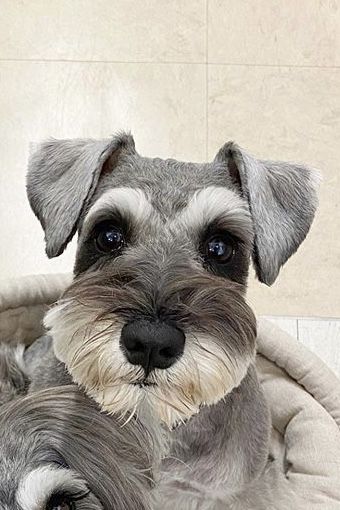
The Miniature Schnauzer has a fascinating history, showcasing its versatility and the development of its unique features. Looking into the origins of the breed, we find:
- A mix of different breeds played a part in creating the Miniature Schnauzer, making it an all-around excellent farm dog.
- There are critical points in history where the breed transitioned from a typical farm dog to one with precise features recognized by leading kennel clubs.
- The breed’s well-known beard and wiry coat came about because they were practical for farm life.
- The Miniature Schnauzer’s temperament and smarts have evolved, making it easy to train and solve problems, making it a popular pet beyond just being a working dog.
Breeders blended the best of various dog breeds in crafting the Miniature Schnauzer. This gave the Miniature Schnauzer the toolkit to excel in farm work. Historical records trace the breed’s journey to becoming one with well-defined physical traits that kennel clubs now celebrate. The breed’s iconic beard and wiry coat didn’t just happen by chance; they were chosen for their practical benefits on the farm.
The Miniature Schnauzer has also developed a temperament and level of intelligence that makes it stand out. Today, this breed is not just for working on a farm but also as a trainable and intelligent family companion. The Miniature Schnauzer has adjusted well beyond its original role and now excels as an affectionate member of many households.
Ancestral Lineage
The Miniature Schnauzer has its roots in Germany, where it began as a multifunctional farm dog in the late 1800s. It was initially bred for catching rats, herding livestock, and protecting homes. The breed descended from the older Standard Schnauzer, which appeared around the same time. Its heritage includes mixing with smaller dogs, such as the Affenpinscher and possibly the Miniature Pinscher.
They also crossbred with Poodles, which helped reduce the dog’s size and shape its unique coat. This breeding intentionally kept the Standard Schnauzer’s hardiness while creating a smaller dog that was more effective for catching rats. The Miniature Schnauzer was officially recognized as its breed by various kennel clubs. The American Kennel Club acknowledged it in 1926, cementing its identity as a distinct type of Schnauzer.
Historical Development
The Miniature Schnauzer has its roots in late 19th-century Germany and was bred for various farm tasks, including ratting, herding, and protection. The breed came into existence by carefully mixing the Affenpinscher, Miniature Pinscher, and Poodle bloodlines.
The year 1888 marks the appearance of the first known Miniature Schnauzer. Dog lovers who appreciated the breed’s unique characteristics formed a club to establish standards and promote the breed’s growth.
Notable Traits Evolution
Initially bred for farm work in 19th-century Germany, Miniature Schnauzers have adapted significantly in both physique and behavior to excel in activities like ratting, herding, and guarding. These medium-sized farm dogs were skilled at pest control and served as alert companions. They likely have an ancestry, including Affenpinschers, Miniature Pinschers, and Poodles, with the earliest record of a Miniature Schnauzer traced to 1888. Breeders intentionally reduced their size to suit their roles, ensuring they remained solid and agile.
Miniature Schnauzers are recognized in four colors worldwide and are quite different from British Terriers, though both are known for their persistent nature. Their German heritage is enriched by the genes of Affenpinschers and other small breeds, resulting in a versatile dog suited for various farm tasks.
Breed Dimensions of Miniature Schnauzers

Examining the Miniature Schnauzer’s physical traits offers insights into how well they fit into different homes and ways of life. Here are the main measurements of the breed:
Miniature Schnauzers stand 12 to 14 inches tall at the shoulder, which makes them a small and easy-to-manage breed. Their weight, ranging from 11 to 20 pounds, suggests they are solid but not too heavy. These dogs typically reach their full size by 12 months, the end of their growth phase. They are known for their square shape and muscular build, which sets them apart from other terrier breeds.
Average Size Range
Miniature Schnauzers stand between 12 and 14 inches tall at the shoulder, placing them in the small to medium-sized dog category. They weigh between 11 to 20 pounds.
There’s usually no significant size difference between the male and female dogs, which makes their size predictable.
These dogs have a solid build and a square look, showing their strength and ability to fit into different homes and lifestyles.
Being the smallest of the Schnauzer breeds, they are well-suited for living in an apartment or a house with more space. Their size is one of their standout features, making them adaptable pets.
Weight and Height
The Miniature Schnauzer stands between 12 to 14 inches tall at the shoulder and weighs 11 to 20 pounds. This breed is an excellent example of a small to medium-sized dog within the Terrier family. Its size makes it perfect for apartment living and homes with larger outdoor spaces.
The Miniature Schnauzer is known for its agility and lively character, which are typical of Terriers. Their coat sheds very little, a bonus for people with allergies. These dogs are adaptable companions and have the ideal combination of strength and size, contributing to their health and versatility as pets.
Growth Stages
Miniature Schnauzers go through significant changes as they grow, usually reaching their full size by the time they are 12 to 18 months old. They are a small to medium breed, standing about 12-14 inches tall and weighing 11-20 pounds when fully grown.
The first few months are a time of quick growth for Schnauzer puppies, and you’ll notice they get bigger quickly. By the time they are 6-8 months old, they will likely be around 75% as big as they will be when they are fully grown, and after this, their growth slows down.
Most Miniature Schnauzers will be fully grown in height and weight by the time they are 10-12 months old, marking the end of their puppy stage and starting as adult dogs.
Breed Size Comparison
Miniature Schnauzers stand out with their small size, making them the tiniest among the Schnauzer family. In contrast, Standard Schnauzers stand considerably taller at 17-20 inches, with Giant Schnauzers reaching a statuesque 24-28 inches.
Miniature Schnauzers are just 12-14 inches tall and weigh a light 11 to 20 pounds, making them perfect for smaller homes. Their manageable size is ideal for different living spaces, from apartments to houses, showing their flexibility as pets.
Unlike their more significant relatives, Miniature Schnauzers don’t need as much room or exercise, which makes them great companions for various lifestyles.
Physical Proportions
Miniature Schnauzers are small dogs with heights ranging from 12 to 14 inches and weights falling between 11 and 20 pounds. Their bodies are nearly square, showing a well-proportioned and sturdy build. This shape aids their quickness and ability to live comfortably in various environments. Their size is ideal for city homes where space is limited. A weight that matches their size is critical to maintaining their health and keeping them active according to their physique.
Easy to Handle and Groom
Due to their moderate size, Miniature Schnauzers are easy to groom and handle. This is a plus for owners, making day-to-day care and exercise less hassle. Their dimensions adhere closely to the breed’s standards, which promotes a sleek outline and smooth movement. This balance makes them suitable for apartment living and ensures they stay healthy and lively.
Temperament and Behavioral Traits
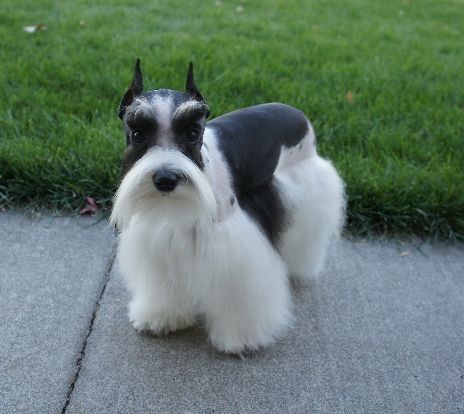
Miniature Schnauzers have diverse behaviors that significantly influence how well they get along with people. It’s essential to look at several aspects to grasp their behavior fully.
Personality Traits: These are the core qualities that shape a Miniature Schnauzer’s character. They are intelligent and often have a lively spirit, so they need engaging activities to keep them happy.
Socialization: Miniature Schnauzers need to interact with both humans and other animals. This helps them develop good manners and prevents them from becoming too territorial or aggressive.
Training: Miniature Schnauzers are keen learners, so positive reinforcement techniques work best. This encourages them to follow commands and strengthens your bond with your pet.
Expected Behaviors: They tend to be alert and curious, which means they might bark at new sights and sounds. Training can help manage this behavior, ensuring they behave well at home and in public spaces.
Personality Traits
Miniature Schnauzers have a lively personality that includes being friendly, intelligent, and devoted. These traits make them excellent watchdogs who are alert to their surroundings. When meeting new people, they can be cautious and usually need their owner to introduce them before interacting freely. These dogs are brilliant, ranking 12th in obedience among 140 breeds, and can solve problems well. Their desire to learn and please people means they can be trained successfully.
However, Miniature Schnauzers need mental challenges to stay well-behaved; without this, they might start causing trouble. Keeping them engaged with activities is necessary to prevent unwanted behavior. They typically live just over 12 years, so it’s essential to care for their health, paying attention to their ears and watching for diseases linked to high fat levels.
Socialization Needs
Miniature Schnauzers are intelligent and keen to learn, but they must start socializing early to behave well around people and other dogs. Owners should introduce their dogs to places, people, and animals while young. This helps prevent the dogs from becoming scared or aggressive in new situations.
Regular, positive interactions are vital in raising a friendly and confident dog. A Miniature Schnauzer that’s been appropriately socialized tends to be better behaved, less anxious, and have a better overall mood, making life with their owner much more enjoyable.
Training Strategies
Effective training strategies for Miniature Schnauzers depend on knowing their smart but sometimes headstrong character. Using consistent, positive reinforcement is vital to teaching them good behavior. These dogs learn quickly because they’re intelligent and stubborn, so patience is necessary. Regularly giving them treats and praise when they do well helps them learn and cooperate.
Early socialization is crucial for a Miniature Schnauzer to become a well-behaved dog comfortable with different people, places, and animals. Keeping them mentally and physically busy is essential to stop them from getting bored and acting out. If they bark a lot, it’s necessary to figure out why and make sure they get plenty of exercise and exciting things to do to keep the barking under control.
Training should also consider their ability to fit into various home settings, making them great pets for families with kids and older adults.
Common Behaviors
Miniature Schnauzers are known for their keen intelligence and watchful nature. These dogs are always on the alert, making them great guards who usually bark before they would ever consider biting when they sense danger. They get along well with other dogs but are often cautious around new people until their owner introduces them.
Because of their strong instinct to chase, Miniature Schnauzers need lots of mental and physical activities to keep them from getting into trouble out of sheer boredom. They rank 12th in obedience smarts, so regular brain games and training are vital to sharpening their problem-solving skills. These furry pals are good at adjusting to different home environments, which makes them flexible pets.
Exercise Requirements
Miniature Schnauzers are bright and energetic, so they must exercise regularly to stay happy and out of trouble. Every day, they should get at least 60 minutes of activity that keeps their body and mind busy.
Ideal activities for these dogs include fast-paced walks, challenging them with puzzle toys, and teaching them new tricks. Miniature Schnauzers are naturally playful and can run and play for a long time, so they need plenty of exercise to prevent them from getting bored and acting out.
Getting involved in dog sports is a great way to provide them with various workouts and mental tasks, which keeps them satisfied and well-behaved. Ensuring your Miniature Schnauzer gets a mix of different types of exercise is crucial to their behavioral health.
Wellness and Longevity Concerns
When evaluating the wellness and longevity of Miniature Schnauzers, several key health considerations must be acknowledged:
- Genetic predispositions to conditions such as pancreatitis and diabetes necessitate a tailored approach to diet and healthcare.
- Proactive measures, including regular ophthalmic examinations, are critical to identify and treat eye disorders like cataracts early on.
- A structured exercise regimen and mental enrichment are vital to mitigate behavioral issues and support cardiovascular health.
Owners must partner with veterinarians to establish and maintain a comprehensive preventive care strategy.
Common Health Problems
Miniature Schnauzers typically live 12-15 years and can experience several health issues. These problems are often associated with high fat levels, diabetes, bladder stones, and eye conditions, impacting their quality of life and longevity. They are generally robust dogs but can develop health issues from genetics and their environment.
People thinking about getting a Miniature Schnauzer puppy should ask about the health history of the pup’s parents. Awareness of hereditary conditions like cataracts is essential as they may require surgery. High fat levels in the blood, known as hyperlipidemia, might need to be managed with medication, diet changes, or supplements. Pancreatitis is another condition that requires careful monitoring and treatment to manage symptoms.
Regular vet check-ups, a balanced diet, and consistent exercise, are vital to keeping Miniature Schnauzers healthy. Responsible breeding practices are also crucial in reducing the risk of genetic health problems.
Diet for Longevity
For Miniature Schnauzers, a nutritious diet is critical to a longer, healthier life, especially since they’re at risk for cataracts and pancreatitis. A diet with their needs in mind can help manage these health problems.
It is critical to feed them according to guidelines from the Association of American Feed Control Officials. Including the right amount of fat, between 10%-15%, can help prevent pancreatitis and hyperlipidemia.
Dietary choices are critical to avoid bladder stones. Keeping an eye on how much they eat, regular vet visits, and meeting their unique nutritional requirements are all part of keeping Miniature Schnauzers healthy and potentially increasing their lifespan.
Preventative Care Tips
A well-rounded approach to preventative care is essential to keep Miniature Schnauzers healthy and increase their lifespan. This includes a custom diet and regular check-ups with the vet, appropriate lifestyle choices, and keeping an eye out for breed-specific health issues.
Miniature Schnauzers are generally robust but tend to conditions like hyperlipidemia, pancreatitis, and eye disorders. Paying close attention to their health is therefore crucial.
A balanced diet, daily exercise, and activities that engage their minds are vital for their health. Regular grooming, such as brushing and caring for their ears, helps avoid skin and ear problems. Staying on top of these routines can lead to the early discovery and treatment of any health issues that may arise.
It’s also important to support ethical breeding, provide a loving home, and create a safe living space for these dogs to ensure they lead a whole and happy life.
Essential Maintenance Needs
Caring for a Miniature Schnauzer involves a diligent maintenance routine to keep them healthy and happy. This includes a few essential practices:
- Regular grooming is vital for this breed; they need consistent haircuts and coat care to prevent matting and maintain healthy skin.
- It’s essential to design a diet considering their energy needs and tendency to lose weight.
- Miniature Schnauzers also need plenty of exercise and mental stimulation to keep their sharp minds active and to help control their high energy levels.
- Routine vet check-ups are crucial for catching and addressing any health issues common to the breed early on.
These steps are essential because Miniature Schnauzers have unique needs that, when met, can lead to a longer and more enjoyable life for your pet. The goal is to keep your Schnauzer healthy, engaged, and free from preventable health problems.
Routine Health Conditions and Checks
It’s vital to take Miniature Schnauzers to the vet regularly. These visits are essential for spotting and handling issues like cataracts, hyperlipidemia, and pancreatitis early on. Even though this breed is known for being robust, anyone considering getting a puppy should ask about the health of its parents. This helps anticipate any inherited health problems.
An eye exam is a good idea to check for cataracts, which might need surgery to fix. Bloodwork can pick up on hyperlipidemia – a fat-related problem in the blood. It’s manageable with medication, special diets, or specific dietary changes.
Pancreatitis is the inflammation of the pancreas and needs close watch, care, and treatment to address symptoms. Keeping up with regular vet visits helps keep these issues in check, ensuring Miniature Schnauzers live a long and happy life.
Daily Grooming Practices
Daily grooming for Miniature Schnauzers is essential for their iconic style and overall health. These dogs have a wiry coat that requires regular care to prevent tangling. Brushing them every day is a must, and they should also receive a trim or hand-stripping every four to six weeks to maintain their signature look. Paying extra attention to the fur around their ears and checking their ears often can help prevent infections. Additionally, it is essential to trim their nails regularly to ensure their comfort. For dental care, brushing their teeth daily and providing dental chews or toys can help prevent dental problems.
Nutritional Diet Plan
For the health and vitality of Miniature Schnauzers, a well-designed nutritional diet is vital. These dogs often face health challenges such as hyperlipidemia, pancreatitis, cataracts, and liver shunts. To deal with these, a low-fat diet is critical. Working with a vet to create a diet that controls fat levels is essential.
Adult Miniature Schnauzers should eat twice a day. Their meals should match their age, size, and how active they are. This helps them stay healthy and live a full 12-15 years. Sticking to the proper diet is crucial for their well-being.
Exercise and Training
Miniature Schnauzers need regular exercise and training to stay healthy and sharp. They require at least an hour of daily activity, including walks and playing games.
Training them with positive feedback helps them learn and behave well. To keep their minds busy and prevent them from getting bored and destructive, it’s essential to give them puzzles and games to solve.
Getting them used to different people and animals early on is vital for them to be friendly and at ease. Miniature Schnauzers also enjoy and benefit from doing agility exercises and participating in dog sports, keeping them active and mentally stimulated.
Behavioral Management Tips
To manage Miniature Schnauzers effectively, it’s vital to have a routine that they can predict. They need enough exercise and things to do that make them think so they don’t get bored and act out. If these intelligent dogs don’t have enough to do, they might start doing things you don’t want them to.
Using rewards in training helps them learn good behavior because they love to have fun and make you happy. Keeping a regular schedule and setting clear rules helps create a stable environment for them to do well.
Getting your Miniature Schnauzer used to different people and places early on is essential. It helps them feel sure of themselves and stops them from acting aggressively because they’re scared. If your dog keeps having trouble with its behavior, getting help from a dog trainer or someone who knows a lot about dog behavior is a good idea.
This can help maintain a peaceful relationship between you and your Miniature Schnauzer.
Dietary Essentials
A balanced diet is critical for the health and well-being of a Miniature Schnauzer. To ensure your Schnauzer thrives, including nutrient-rich foods specific to their needs is essential. Choose high-quality, easily digestible food suitable for their age. Regular feeding times support their metabolism. Monitor their food intake and adjust it based on how active they are to prevent weight gain. These steps will help improve your Miniature Schnauzer’s quality of life and longevity.
Critical Factors in a Schnauzer’s Diet
When planning your Schnauzer’s meals, it’s vital to select foods rich in nutrients to meet the dog’s unique dietary needs. Opt for high-quality options that match the dog’s growth stage. A consistent feeding routine is beneficial for their metabolism. Monitor portion sizes to maintain a healthy weight, especially if your dog is less active. This attention to their nutrition can significantly affect their overall health and lifespan.
Balanced Nutrition Importance
For a Miniature Schnauzer to be energetic and healthy, they need a well-balanced diet. The right mix of protein, carbs, fats, vitamins, and minerals is vital.
This breed is naturally robust, but food can boost their immune system. Proteins are critical for keeping muscles strong, while carbs are the primary fuel source. Fats help them absorb vital vitamins and keep their coat shiny.
Vitamins and minerals help the dog’s body function properly and avoid health issues. Water is also necessary for good digestion and keeping their body temperature stable.
Watching how much they eat and following a regular feeding schedule is crucial to prevent weight gain. This helps keep a Miniature Schnauzer in great shape.
Appropriate Food Choices
Choosing the right food for a Miniature Schnauzer means picking a balanced diet that complies with the Association of American Feed Control Officials (AAFCO) guidelines. These guidelines help ensure the health and well-being of your dog. Adult Schnauzers usually need two meals a day that match their energy needs.
For puppies who are still growing, it’s essential to feed them more often. This helps them get the nutrients they need for their growth. If you’re getting a Miniature Schnauzer, you should look into its family health history. Knowing about genetic health issues can guide you in making the best food choices.
A diet low in fat is recommended to prevent issues like hyperlipidemia and pancreatitis. Along with a proper diet, regular check-ups with a vet are essential. This will help keep your Miniature Schnauzer healthy by monitoring its diet, exercise, and mental stimulation.
Feeding Schedule Guidelines
For Miniature Schnauzers, a balanced diet is critical, and a regular feeding routine is vital for their health. Puppies should eat twice daily to maintain their energy and well-being.
Choose quality dog foods that meet the AAFCO standards to ensure your pet gets the proper nutrients. Keep an eye on the fat levels in their meals, aiming for a moderate 10% to 15% to avoid health issues from too much fat.
Calories matter too, and it’s best to tailor the amount you feed your Miniature Schnauzer based on their age, size, and how active they are. This helps prevent overfeeding and the health problems it can bring.
Regularly checking in with your vet can help you stay on track with your dog’s nutrition and portion sizes, contributing to their health and longevity.

